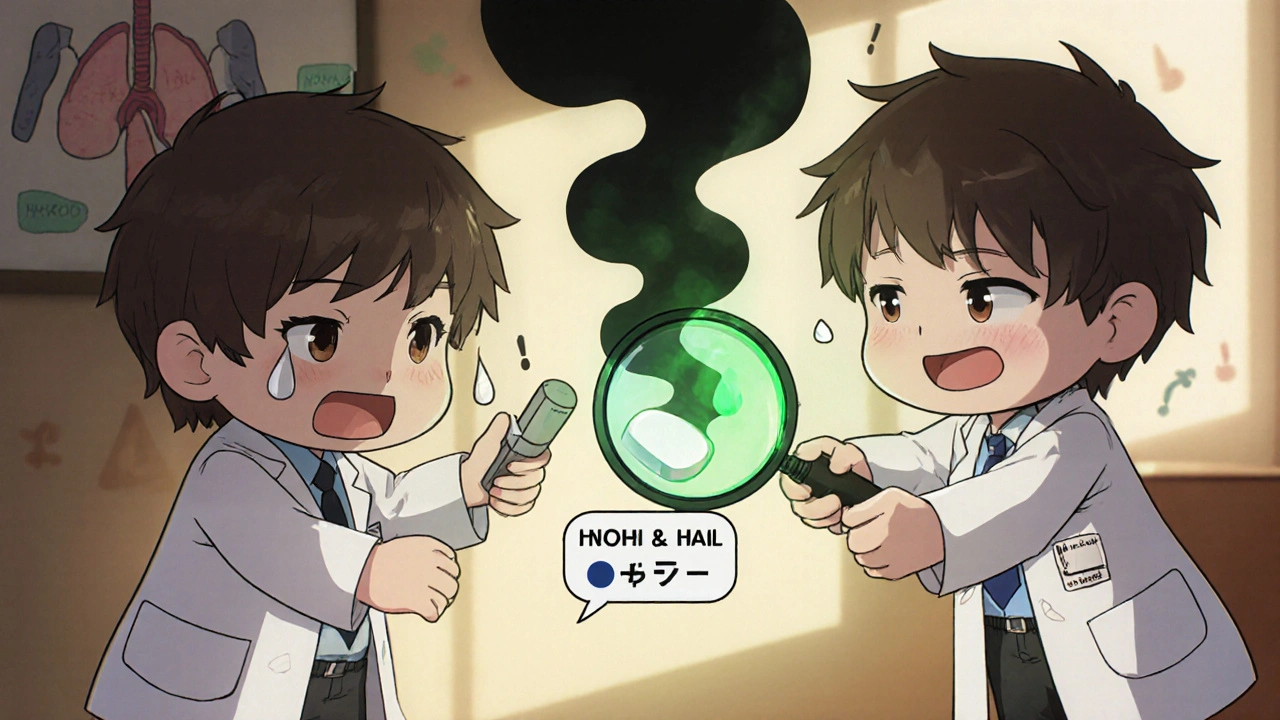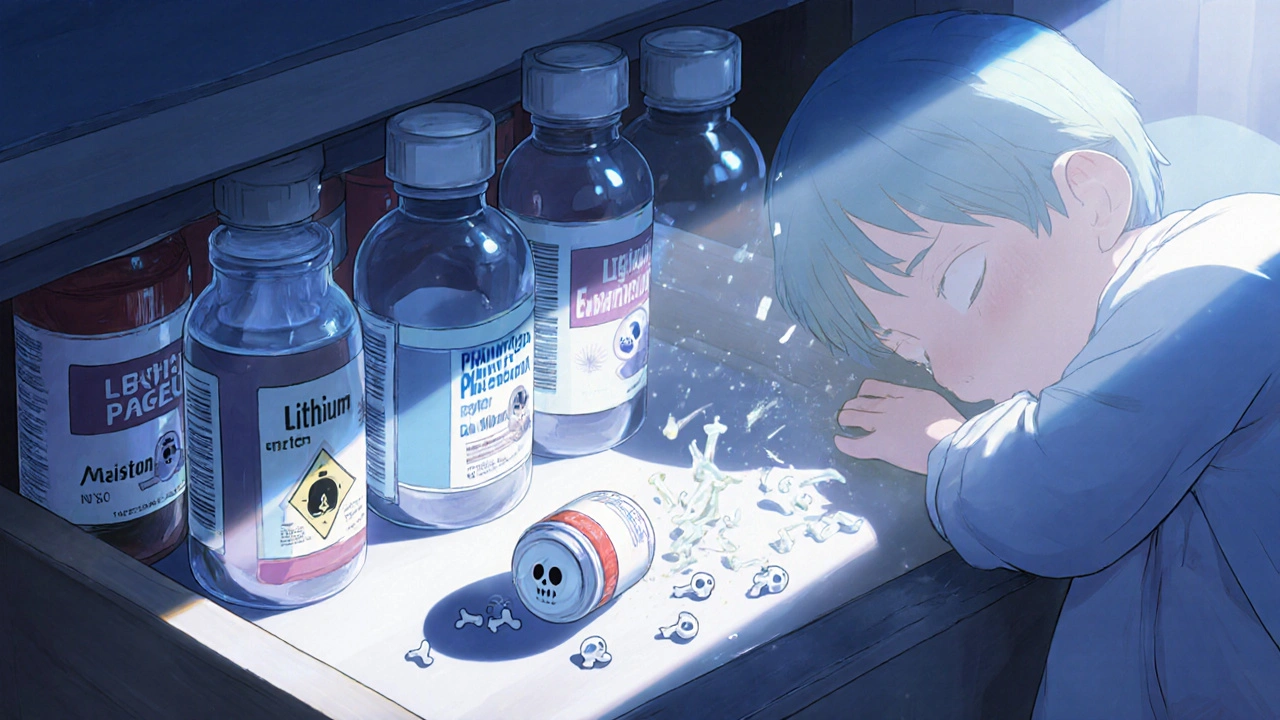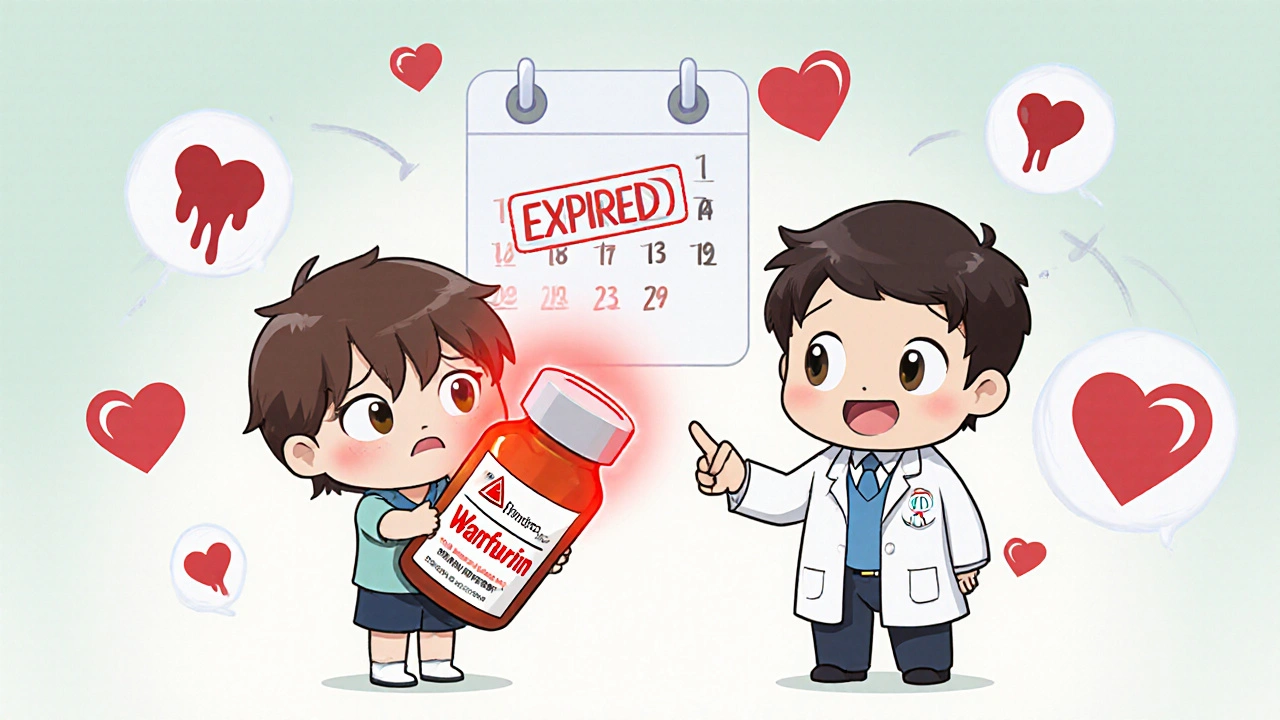Medications with a Narrow Therapeutic Index and Expiration Risk: Why Expired Drugs Can Be Dangerous
10 Nov, 2025Some medications don’t just lose effectiveness when they expire-they can become dangerous. This is especially true for drugs with a narrow therapeutic index (NTI). These aren’t your average painkillers or antihistamines. They’re the kind that require precision: too little doesn’t work, too much can kill you. And if they’ve passed their expiration date, that fine line between healing and harm becomes even thinner.
What Exactly Is a Narrow Therapeutic Index?
A narrow therapeutic index means the difference between a safe, effective dose and a toxic one is razor-thin. For most drugs, your body can handle a bit more or less without consequences. But for NTI medications, even a 10% change in blood concentration can cause serious harm.
The U.S. Food and Drug Administration defines NTI drugs as those where small changes in dose or blood levels can lead to life-threatening failures or adverse reactions. Think of it like driving a car with no speedometer. You know you need to go 60 mph, but if you’re off by just 5 mph, you could crash or get pulled over. For NTI drugs, the margin of error is even smaller.
Common examples include:
- Warfarin (blood thinner)
- Lithium (for bipolar disorder)
- Digoxin (for heart failure)
- Phenytoin (for seizures)
- Levothyroxine (for thyroid conditions)
- Carbamazepine (for epilepsy and nerve pain)
These drugs aren’t just sensitive-they’re monitored. Doctors regularly check blood levels to make sure they’re in the right range. For digoxin, the safe window is between 0.5 and 0.9 nanograms per milliliter. Toxicity starts above 1.2. That’s less than a 33% increase from the top of the safe range to the danger zone.
Why Expiration Dates Matter More for NTI Drugs
Expiration dates aren’t arbitrary. They’re based on rigorous testing by manufacturers to guarantee the drug stays at least 90% potent and completely safe under proper storage. For most medications, a small drop in potency might mean it takes a little longer to relieve a headache. For NTI drugs, that same drop can mean the difference between life and death.
Take warfarin. Patients on warfarin need their INR (a blood clotting measure) kept between 2.0 and 3.0. If their INR drops below 2.0, they risk a stroke or pulmonary embolism. If it rises above 4.0, they could bleed internally. A 10% loss in potency from an expired warfarin tablet could lower the drug’s effect enough to push INR out of range. That’s not theoretical-it’s been documented in clinical studies.
And it’s not just about losing strength. Some drugs break down into harmful substances over time. Tetracycline, for example, degrades into a compound that can damage kidneys. While tetracycline isn’t an NTI drug, it shows that degradation isn’t always harmless. For NTI drugs, we don’t have full data on what their breakdown products do-but we know even tiny changes in concentration are risky.
The FDA requires stricter bioequivalence standards for generic NTI drugs. While most generics must be 80-125% as potent as the brand name, NTI drugs like phenytoin and levothyroxine must stay within 90-111%. That’s a 22% tighter window. If a drug degrades by just 5% past its expiration date, it’s already outside that narrow acceptable range.
What Happens When You Take an Expired NTI Drug?
There are two real dangers: underdosing and overdosing-both can be deadly.
Underdosing: If the drug has lost potency, it won’t work. A patient on levothyroxine might think their fatigue is just stress. But if their thyroid hormone levels drop too low, they could develop myxedema coma-a rare but fatal condition. Someone on carbamazepine might have a seizure because the drug no longer controls brain activity.
Overdosing: This is less common but still possible. Some NTI drugs degrade unpredictably. If a tablet breaks down unevenly, one pill might have more active ingredient than another. A patient taking lithium might think they’re getting the same dose every day-but if one tablet has degraded into a more concentrated form, their blood lithium level could spike into the toxic range. Symptoms? Tremors, confusion, kidney damage, seizures, even cardiac arrest.
A 2014 study in the Journal of Clinical Pharmacy and Therapeutics found that drug-related problems with NTI medications were far more likely to cause serious harm than with other drugs. That’s why the Institute for Safe Medication Practices lists all NTI drugs as high-alert medications. They require double-checks, independent verification, and strict handling protocols. Expired ones? They shouldn’t even be in the cabinet.

What Do Pharmacists and Doctors Say?
Healthcare professionals treat NTI drugs with extreme caution. A 2018 survey in Pharmacy Times found that 67% of pharmacists said they exercise special care when dispensing warfarin between different brands or generics. That’s because even small differences in formulation can affect absorption.
Now imagine that same pharmacist handing you a bottle of warfarin that’s been sitting on a shelf for three years past its expiration date. The packaging says “store at room temperature.” But your bathroom is humid. Your kitchen cabinet gets hot in summer. That pill may have degraded faster than expected.
Pharmacists in North Carolina are required to consider NTI drugs as having “limited or erratic absorption” and “formulation-dependent bioavailability.” That means the body doesn’t absorb them the same way every time-even when they’re fresh. Expired? The uncertainty grows. There’s no way to know if the pill you’re taking today will work like the one you took last week.
The American College of Clinical Pharmacy advises that for NTI drugs, “even minor changes in drug concentration can necessitate dose adjustments.” That means if you take an expired pill and your blood level changes, your doctor has to retest you, adjust your dose, and monitor you again. All because you saved a few dollars by not replacing a bottle.
What Should You Do?
If you take any NTI medication, here’s what you need to do:
- Never use expired NTI drugs. This isn’t a suggestion-it’s a safety rule. Don’t rely on “it probably still works.”
- Store them properly. Keep them in a cool, dry place. Not the bathroom. Not the car. A bedroom drawer is better.
- Check expiration dates every 3 months. Set a calendar reminder. When it’s close to expiring, call your pharmacy to refill early.
- Dispose of expired NTI drugs safely. Don’t flush them. Don’t throw them in the trash. Take them to a drug take-back program. Many pharmacies offer this for free.
- Ask your pharmacist. If you’re unsure whether your medication is an NTI drug, ask. They can tell you and explain why it matters.
For patients on levothyroxine, lithium, or warfarin, consistency is everything. Your body depends on the same dose, every day, with the same potency. Expired medication breaks that consistency. And for these drugs, inconsistency can be fatal.

Is There Any Research on Expired NTI Drugs?
Surprisingly, there isn’t much. No large clinical studies have tested whether expired NTI drugs are still safe or effective. The FDA’s 2015 report admits there are “no well-controlled clinical studies to evaluate the within-subject variability of the clinical response of NTI drugs” after expiration.
That doesn’t mean it’s safe. It means we’re working with incomplete data-and the risks are too high to gamble.
Manufacturers are starting to test stability beyond expiration dates for critical NTI drugs. One 2022 industry report found that 78% of major pharmaceutical companies now conduct extended stability testing on these medications. But that’s for controlled lab conditions-not your medicine cabinet.
Until we have solid data, the safest approach is to assume expired NTI drugs are unreliable. And that’s not fear-it’s science.
What About the FDA’s Claim That Most Drugs Last Years Beyond Expiration?
You may have heard that the FDA found most medications retain potency for years past their label date. That’s true-but it’s misleading.
The 1985 FDA study looked at non-NTI drugs: antibiotics, antihistamines, pain relievers. These drugs have wide safety margins. Losing 10% potency? No big deal.
NTI drugs are not in that category. Their safety margin is too small. Even if a warfarin tablet still has 90% potency, that’s enough to push a patient’s INR out of range. For these drugs, “still potent” doesn’t mean “safe.”
So don’t use the FDA’s general findings as a green light for NTI drugs. That’s like saying, “My car’s brakes are old, but most cars still stop fine.” You wouldn’t risk it. Don’t risk your life either.
Bottom Line
NTI drugs aren’t like other medications. They demand precision. They require trust. And they deserve respect.
Expiration dates on these drugs aren’t just bureaucratic footnotes-they’re life-or-death deadlines. Taking an expired NTI drug isn’t a cost-saving trick. It’s a gamble with your health, and the odds are stacked against you.
If you’re on one of these medications, treat it like you would a life-support system: keep it fresh, keep it stored right, and never use it past its date. Your body can’t afford a mistake.
Are expired NTI drugs always dangerous?
While not every expired NTI drug will cause harm, the risk is unpredictable and potentially life-threatening. Even small changes in potency can push blood levels outside the narrow therapeutic window, leading to serious complications like blood clots, seizures, or organ toxicity. Because degradation varies by storage conditions and formulation, there’s no safe way to guess whether an expired NTI drug still works. The only safe choice is to replace it.
Can I use an NTI drug if it’s only a few months past expiration?
No. The expiration date is the last day the manufacturer guarantees full potency and safety. For NTI drugs, even a few months past expiration can mean the difference between therapeutic and toxic levels. For example, a 5% loss in potency for warfarin or levothyroxine could require a dose adjustment-and you wouldn’t know until your blood test. Don’t wait for symptoms to appear. Replace it.
How do I know if my medication has a narrow therapeutic index?
Check the drug label or ask your pharmacist. Common NTI drugs include warfarin, lithium, digoxin, phenytoin, levothyroxine, carbamazepine, and cyclosporine. If your doctor monitors your blood levels regularly (like INR for warfarin or lithium levels), you’re likely on an NTI drug. Don’t assume-confirm.
Can I split NTI pills to save money?
It’s not recommended. NTI drugs often have inconsistent drug distribution within the tablet. Splitting can lead to uneven doses-especially if the tablet isn’t scored or if the coating is damaged. For drugs like phenytoin or carbamazepine, this can cause dangerous fluctuations in blood levels. Always take the prescribed dose as a whole tablet unless your doctor specifically approves splitting.
What should I do if I accidentally took an expired NTI drug?
Contact your doctor or pharmacist immediately. Don’t wait for symptoms. For drugs like warfarin or lithium, your blood level may need to be checked right away. If you’re on anticoagulation therapy, you may need an INR test within 24 hours. For lithium, a blood level test is critical to prevent toxicity. It’s better to be safe than sorry.

Gary Hattis
November 11, 2025 AT 12:49I’ve been on warfarin for 8 years. My INR’s been stable as hell, but I still replace my script every 30 days like clockwork. One time I tried stretching it to 45 days because I was broke and lazy. Didn’t even feel different-until my next blood test. INR dropped to 1.7. Could’ve had a stroke. Not worth the risk. Just get the damn refill.
Pharmacists aren’t being dramatic. This stuff is precision medicine. You wouldn’t drive a car with worn brakes and say ‘it’s probably fine.’ Same deal.
Esperanza Decor
November 12, 2025 AT 08:55I work in a nursing home and we’ve had two near-misses with expired levothyroxine. One elderly patient was lethargic, confused, and we thought it was dementia. Turned out her meds were 11 months past expiration. Her TSH was through the roof. We switched her out, and within 72 hours she was back to reading the paper and arguing with the staff about the crossword. It’s not just about potency-it’s about consistency. Her body needed that exact dose, every day. No room for guesswork.
Deepa Lakshminarasimhan
November 12, 2025 AT 12:57Anyone else think the FDA’s just covering for pharma companies? They say ‘expiration dates are guarantees’ but what if they’re just making us buy more? I read somewhere that 90% of drugs are still potent years later. Why are NTI drugs the exception? Seems like a money grab. I’ve got a bottle of lithium that’s 2 years expired. I’ve been fine. My bloodwork’s normal. Maybe the ‘danger’ is just hype to sell new bottles.
They don’t want us to know how cheap it is to make these pills. You think they care if you live or die? Nah. They care about quarterly profits.
Johnson Abraham
November 13, 2025 AT 01:34lol yall actin like expired warfarin is gonna kill u. i took my digoxin that was 18mos past exp and i’m still alive. my heart still beats. i think the whole ‘narrow therapeutic index’ thing is just fearmongering. they want you scared so you buy new bottles every month. dumb. also, why do they even put expiration dates if the drugs last forever? conspiracy. 🤡
Shante Ajadeen
November 14, 2025 AT 01:29Thank you for this post. I’ve been on carbamazepine for seizures and I never realized how delicate the balance is. I used to keep my meds in the bathroom because it was convenient. Now they’re in a sealed container in my bedroom drawer. I check the date every time I take one. It’s scary how easy it is to overlook something that could literally kill you. Small changes add up. I’m glad I read this before it was too late.
dace yates
November 14, 2025 AT 15:45Is there any data on how humidity and heat affect NTI drugs in real-world conditions? Like, if someone lives in Florida or Arizona, does the degradation happen faster than the lab tests suggest? I’m curious if the ‘room temperature’ storage label is even realistic for most people.
Danae Miley
November 16, 2025 AT 04:49Johnson Abraham’s comment is dangerously misleading. There is no credible evidence that expired NTI drugs remain safe or effective beyond their labeled date. The FDA’s 1985 study explicitly excluded NTI medications. The claim that ‘90% of drugs are still potent’ is irrelevant here-potency isn’t the only variable. Degradation products, dissolution rates, and bioavailability all shift unpredictably. For lithium, even a 5% increase in serum concentration can trigger toxicity. This isn’t speculation. It’s pharmacokinetics. Don’t gamble with your life because someone on Reddit said it’s ‘probably fine.’
Charles Lewis
November 16, 2025 AT 08:21As a clinical pharmacist with over 25 years in practice, I’ve seen the consequences of expired NTI drugs firsthand. A patient on cyclosporine after a kidney transplant took a bottle that was 14 months past expiration. His levels dropped. He rejected the graft. He had to go back on dialysis. His family didn’t understand why the pharmacy wouldn’t refill it early. They thought he was being ‘overly cautious.’
The truth is, NTI drugs operate on a razor’s edge. The body doesn’t ‘adapt’ to lower potency. It doesn’t ‘compensate.’ It just fails. And when it fails, it fails fast. There’s no second chance. No ‘I’ll just take an extra pill next time.’
Manufacturers set expiration dates based on stability testing under controlled conditions. Your bathroom isn’t controlled. Your attic isn’t controlled. Your car in July isn’t controlled. That pill you’re holding? It’s not the same pill you got in January.
I tell every patient on an NTI drug: if the date’s expired, treat it like expired milk. Throw it out. Don’t think. Don’t rationalize. Don’t hope. Just replace it. Your life depends on it more than your wallet does.